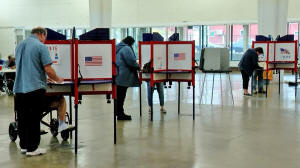Feds weigh in on lawsuit challenging how Illinois maintains voter
registration rolls
[July 24, 2025]
By Peter Hancock
The U.S. Department of Justice added its voice this month to a lawsuit
by private entities accusing the state of Illinois of failing to
properly maintain a statewide voter registration list, in violation of a
1993 federal law.
In a filing known as a “statement of interest,” the Justice Department
said the government has an interest in the outcome of the lawsuit,
although the filing stops short of asking the court for permission to
intervene as a party in the case.
“This case presents important questions regarding enforcement of the
National Voter Registration Act,” attorneys in DOJ’s Civil Rights
Division said in the filing. “Congress has vested the Attorney General
with authority to enforce the NVRA (National Voter Registration Act) on
behalf of the United States. Accordingly, the United States has a
substantial interest in ensuring proper interpretation of the NVRA.”
The lawsuit challenges the state’s practice of delegating to local
election officials the responsibility of conducting regular maintenance
of voter registration rolls, including the task of purging people from
the rolls when they die or move out of the jurisdiction. Under NVRA, the
suit argues, the state is responsible for carrying out that function.
U.S. District Court for the Northern District of Illinois Judge Sara
Ellis has indicated she could decide the case at a hearing currently
scheduled for July 30.
The DOJ filing comes at the same time the Trump administration has been
launching multi-pronged efforts for the federal government to exert more
influence over voter registration in the United States, a task
traditionally reserved for states.

In March, Trump signed an executive order purporting to require people
to show documentary proof of U.S. citizenship when they register to
vote. That order has since been blocked from being enforced while a
legal challenge to it proceeds.
Meanwhile, the Washington Post reported July 16 that the DOJ has asked
at least nine other states for complete copies of their voter rolls, and
at least two reportedly have turned them over.
So far, the DOJ has not requested similar data from Illinois. Officials
at the Illinois State Board of Elections declined to comment on the DOJ
filing, saying they do not comment on pending litigation.
Basis of lawsuit
The suit was filed in 2024 by Judicial Watch, a conservative legal
advocacy group known for filing Freedom of Information Act lawsuits to
investigate allegations of official misconduct.
Other plaintiffs include Wheaton-based Breakthrough Ideas, a
conservative advocacy group headed by former Republican state Rep.
Jeanne Ives; Illinois Family Action, a Christian political advocacy
group based in Tinley Park; and Carol J. Davis, identified as a DuPage
County resident and member of Judicial Watch.
The complaint is based on a provision of NVRA that requires states to
“conduct a general program that makes a reasonable effort to remove the
names of ineligible voters from the official lists of eligible voters”
if they have died or changed their address.

[to top of second column]
|

Voters cast their ballots in Springfield during the 2024 general
election in November. (Capitol News Illinois photo by Andrew
Campbell)

The complaint also cites federal regulations that require each
state’s chief election officer to submit various kinds of
election-related data to the federal Election Assistance Commission,
including “the total number of registrations statewide that were,
for whatever reason, deleted from the registration list … between
the past two federal general elections.”
The election commission collects that data and publishes biennial
reports that are delivered to Congress summarizing the information
it receives.
According to the complaint, the commission’s reports indicated that
much of the required information from Illinois was missing. For
example, the complaint notes, from November 2020 through November
2022, 11 Illinois counties reported removing zero voters from their
registration lists, suggesting that no registered voters had moved
or died in those counties over the two-year period. Twelve other
counties reported removing 15 or fewer registrations over that same
period.
The complaint described those as “absurdly small numbers,” given
that those 23 counties were home to more than 980,000 registered
voters.
In a letter to Judicial Watch responding to a request to supply the
missing data, State Board of Elections Executive Director Bernadette
Matthews wrote that the agency does not maintain such information
because Illinois is a “bottom up jurisdiction” where local
jurisdictions – including 102 counties and six municipal election
authorities – are responsible for maintaining their own voter
registration lists.
“This makes sense, as local election authorities are responsible for
determining a voter’s continuing eligibility to vote in their
jurisdiction,” Matthews wrote.
The plaintiffs, however, argue that NVRA gives states the
responsibility for keeping voter registration lists up to date, and
they cannot delegate that responsibility to local jurisdictions.
That is also the argument that the DOJ made in its statement of
interest.
“By its plain terms, the NVRA identifies one entity—the state—to
carry out the administration of voter registration for federal
elections,” DOJ argued.

Defendants’ response
The Illinois attorney general’s office, which is defending the State
Board of Elections, has filed a motion to dismiss the complaint,
arguing the plaintiffs lack standing to bring the suit. It also
claims the plaintiffs have not stated a valid claim because NVRA
allows states to delegate its responsibilities to local authorities.
Two labor unions — the Illinois AFL-CIO and the Illinois Federation
of Teachers — have intervened in support of the state’s position.
They argue that they spend considerable resources to ensure their
members can vote in Illinois elections and they have an interest in
making sure none of their members are unlawfully purged from the
voter rolls if the plaintiffs succeed in the case.
All contents © copyright 2025 Associated Press. All rights reserved |